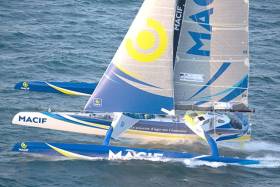Displaying items by tag: Plymouth to New York
Macif on Track for Transat Race Record Smash
The Transat bakerly from Plymouth to New York is in its final stages for Macif skipper François Gabart who is now just over 450nm away from the finish line. The current routing is showing Gabart’s estimated time of arrival as tomorrow at 1300 EDT (1800 BST).
Now well into his seventh day of racing, Gabart is 126 miles away from his closest rival Thomas Coville aboard Sodebo, and 473 miles ahead of the third Ultime Actual, skippered by Yves Le Blevec.
Gliding towards the Big Apple at around 20 knots, the 33-year-old skipper looks set to break The Transat bakerly race record tomorrow. Gabart’s mentor and friend, Michel Desjoyeaux, currently holds the record after sailing the ORMA trimaran Géant from Plymouth to Boston in 2004, in a time of eight hours, eight days and 29 minutes.
Although sailing towards a different finish line, this year’s edition of The Transat bakerly to New York is in fact longer than the record-setting course to Boston. If Gabart can finish before 1730pm local time tomorrow, the record is his.
However, although closing on a first solo win in his magnificent new racing machine, there are still 450nm to go. Speaking briefly via sat phone this morning, Gabart was keen not to tempt fate, well aware that a small mistake or a breakage could yet be his undoing. He was also not underestimating Coville, saying he expects a furious fight to the finish.
For the other classes in the fleet, the New York City skyline is over 1,000 miles away. This morning, Armel Le Cléac’h (Banque Populaire) continues to lead the IMOCA 60 fleet by 42 miles, with Vincent Riou on PRB still hot on his stern.
After a week of racing at breakneck speed, followed by a rough and uncomfortable weekend, Le Cléac’h is enjoying a little respite in lighter airs this morning.
“The conditions are much calmer,” he reported. “I’m taking advantage of not having the boat so heeled over. I can stand up normally to eat and I’ve been able to dry out a little.
“It’s been damp on board since the start and we’ve not had much time to rest and regroup. The race is still very much in full force and I’m always watching my friends behind. Vincent (Riou) is always close and, in the lighter wind conditions, I do not feel comfortable. Adding to that pressure is Jean–Pierre (Dick on St Michel-Virbac in third place). The race to the finish is set. We’re only lacking Jojo!" (Sébastien Josse on Edmond de Rothschild who retired early in the race with broken mainsail battens).
In the four-boat Multi50 class, Gilles Lamiré (French Tech Rennes St Malo) still leads the fight with an advantage of 193 miles between him and the chasing Lalou Roucayrol (Arkema).
Thibaut Vauchel-Camus (Solidaires en Peloton–Arsep) continues to lead the nine-boat Class40 fleet, locked in battle with Isabelle Joschke (Generali–Horizon Mixité) just four miles behind.
After carrying out a six-hour stop-go time penalty yesterday, British skipper Phil Sharp is now back in the race on Imerys and is holding onto third place and only 21 miles behind the leader. With at least eight days of racing still ahead of him, Sharp has by no means given up hope of regaining the top spot in the class.
“I'm determined to make up the miles and I'll be seeking every advantage possible,” he said. “There are several compression zones in the weather between now and the finish, so I hope I can take advantage of these, and try and get back in front before New York. It's a hell of a long race - we still have another 2,000 miles to go - so anything can happen!"
























































